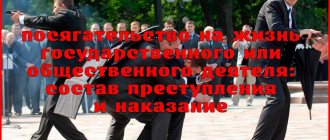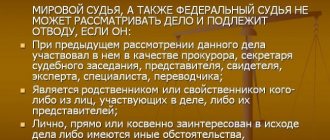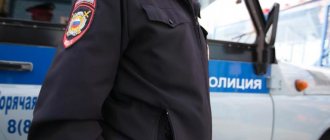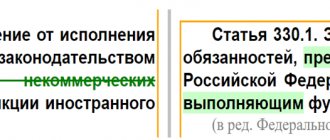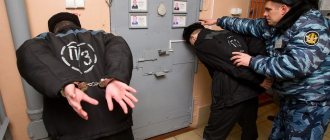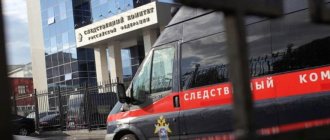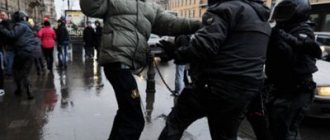Encroachment on the life of a law enforcement officer, military personnel, as well as their relatives in order to impede the legitimate activities of these persons to protect public order and ensure public safety, or out of revenge for such activities -
shall be punishable by imprisonment for a term of twelve to twenty years with restriction of freedom for a term of up to two years, or life imprisonment, or the death penalty.
- Article 316. Concealment of crimes
- Article 318. Use of violence against a representative of the authorities
Commentary to Art. 317 of the Criminal Code of the Russian Federation
The main object of the crime is the normal activities of law enforcement agencies. An additional object is the life of a law enforcement officer, military personnel, as well as their loved ones.
This crime is two-part.
In contrast to the corpus delicti provided for in Art. 295 of the Criminal Code of the Russian Federation, the norm in question ensures the protection of the lives of the above-mentioned subjects not in connection with the activities of administering justice or preliminary investigation, but in connection with the activities of protecting public order and ensuring public safety.
Law enforcement agencies in relation to Art. 317 of the Criminal Code of the Russian Federation are the Ministry of Internal Affairs, security agencies, penal systems, etc.
Military service is a special type of federal public service performed by citizens in the Armed Forces of the Russian Federation, as well as in the internal troops of the Ministry of Internal Affairs of the Russian Federation, in the civil defense forces, engineering, technical and road construction military formations under the federal executive authorities, the Service foreign intelligence of the Russian Federation, bodies of the Federal Security Service, federal body of special communications and information, federal bodies of state security, federal body for ensuring mobilization training of government bodies of the Russian Federation, military units of the federal fire service and special formations created for wartime, as well as foreign citizens in the Armed Forces of the Russian Federation, other troops, military formations and bodies.
Citizens (foreign citizens) undergoing military service are military personnel and have the status established by Federal Law of March 28, 1998 N 53-FZ “On Military Duty and Military Service”.
———————————
NW RF. 1998. N 13. Art. 1475.
The concept of close persons is considered in relation to the corpus delicti under Art. 105 of the Criminal Code of the Russian Federation.
The objective side of the crime under Art. 317 of the Criminal Code of the Russian Federation, is expressed in active actions aimed at depriving the life of a law enforcement officer, military personnel, as well as their loved ones.
Responsibility under Art. 317 of the Criminal Code of the Russian Federation occurs if an encroachment on the lives of the persons named therein was carried out in order to impede activities to protect public order and ensure public safety or out of revenge for such activities.
Activities to protect public order involve the prevention, suppression and detection of offenses committed in public places that violate the rights and legitimate interests of an indefinitely large number of persons. Ensuring public safety consists of protecting the vital interests of the individual, society and the state from external and internal threats (for example, ensuring air safety, suppressing riots, preventing acts of terrorism, providing assistance to victims of natural disasters, etc.).
Encroachment on the life of any of the persons listed in Art. 317 of the Criminal Code of the Russian Federation, not related to this activity, should be qualified as a crime against the person.
In the theory of criminal law, an attempt on life is understood as murder or attempted murder.
———————————
See: Resolution of the Plenum of the Supreme Court of the USSR of September 22, 1989 No. 9 “On the application by courts of legislation on liability for attacks on the life, health and dignity of police officers, people's vigilantes, as well as military personnel in connection with the performance of their duties to protect public order "
An attack on the life of persons listed in the article in question of the Criminal Code of the Russian Federation, as well as their loved ones, must be qualified under Art. 317 of the Criminal Code of the Russian Federation, regardless of whether the death was caused to the victim or did not occur due to reasons independent of the will of the perpetrator. According to the design of the objective side, this crime is truncated. The crime is considered completed at the moment of an attack on the life of the person specified in the disposition of the article in question, therefore, when qualifying such actions, a reference to Art. 30 of the Criminal Code of the Russian Federation (attempted crime) is not required. At the same time, the fact of causing death does not require additional qualification under paragraph “b” of Part 2 of Art. 105 of the Criminal Code of the Russian Federation, since this crime is a special corpus delicti of murder under aggravating circumstances.
The subjective side of the crime in question is characterized by an intentional form of guilt. With a direct legislative indication of the purpose of the crime, the subjective side is expressed in the form of direct intent, i.e. when the actions of the perpetrator indicate that he foresaw the onset of death and desired it.
Mandatory features of the subjective side of a crime are the purpose of the crime (obstruction of the legitimate activities of these persons to protect public order and ensure public safety - the desire to stop, change such activities now or in the future) or motive (revenge for such activities - for actions already performed).
The subject of a crime can be a sane person who has reached the age of sixteen (general subject). If an attack on the above persons was carried out by minors aged from fourteen to sixteen years, then it must be qualified under paragraph “b” of Part 2 of Art. 105 of the Criminal Code of the Russian Federation.
Responsibility measures
The Criminal Code of the Russian Federation, in relation to crimes related to the utterance or implementation of threats against a law enforcement officer, presents, in general, two articles that should be referenced in order to understand the scope of the possible punishment. These are the articles:
- Article 119, which prescribes punishment in general for uttering threats against one person and members of his family, as well as a group of persons (can be used as a general punishment for uttering threats if there is every reason to fear them in real terms);
- Article 296, which defines the main forms of punishment for uttering threats in connection with the administration of justice or preliminary investigation (applied mainly to protect judges and members of their families, but, in some cases, also against police officers);
- Article 317, which is directly devoted to threats against the life and health of police officers and other law enforcement agencies and punishment for uttering such threats (most often this article is used to impose punishment).
Most often, threats against the life and health of a police officer and his family members are made in connection with the direct performance of his professional activities, as well as as revenge for it (for example, if such threats are made against a retired police officer). Punishment for such a crime is provided for in Article 317 of the Criminal Code of the Russian Federation.
Article 319 of the Criminal Code of the Russian Federation
A public rude statement addressed to a police officer (insult) while he is on duty and performing his duties is a criminal offense.
The danger of this offense is that the culprit infringes on the activities of authorities, their authority, the honor and dignity of the policeman. The Criminal Code of the Russian Federation provides for liability for this in Article 319.
Judicial practice under Article 317 of the Criminal Code of the Russian Federation
“Review of the practice of the Constitutional Court of the Russian Federation for 2017”
Criminal cases charging women with crimes under part four of article 210, part five of article 228.1, part four of article 229.1, articles 277, 295, 317 and 357 of the Criminal Code of the Russian Federation, if judicial hearings on these criminal cases have not been scheduled at the time the Resolution enters into force; they are subject to consideration by the supreme court of the republic, a regional, regional or other court of equal level, and, at the request of the accused, by a court composed of a judge of such a court and a panel of twelve jurors. The jurisdiction and composition of the court in criminal cases, court hearings for which at the specified time have already been scheduled for consideration, are not subject to change, including within the framework and as a result of their consideration in the appeal, cassation and supervisory procedures.
Appeal ruling of the Judicial Collegium for Criminal Cases of the Supreme Court of the Russian Federation dated June 14, 2018 N 78-APU18-10SP
sentenced to imprisonment: under Part 2 of Art. 209 of the Criminal Code of the Russian Federation for 9 years with restriction of freedom for 1 year; according to Part 1 of Art. , paragraphs “a”, “b”, part 4, art. 162 of the Criminal Code of the Russian Federation for 4 years 6 months; according to clause “a”, part 4, art. 162 of the Criminal Code of the Russian Federation (in relation to R.’s property) for 9 years; according to clause “a”, part 4, art. 162 of the Criminal Code of the Russian Federation (in relation to the property of LLC "... ") for 8 years; according to clause “a”, part 4, art. 162 of the Criminal Code of the Russian Federation (in relation to the property of LLC "... ") for 8 years 6 months; according to clause “a”, part 4, art. 162 of the Criminal Code of the Russian Federation (in relation to property in the club on Avenue ...) for 8 years 6 months; according to clause “a”, part 4, art. 162 of the Criminal Code of the Russian Federation (in relation to the property of K. and LLC "... ") for 9 years; according to Part 1 of Art. , clause “a”, part 4, art. 162 of the Criminal Code of the Russian Federation for 4 years 6 months; according to Art. 317 of the Criminal Code of the Russian Federation for 14 years with restriction of freedom for 1 year; according to Part 3 of Art. 222 of the Criminal Code of the Russian Federation for 6 years; on the basis of Part 3 of Art. of the Criminal Code of the Russian Federation for a totality of crimes by partial addition, finally for 16 years in a high-security correctional colony with restriction of freedom for 1 year 6 months, with established restrictions: do not leave your home from 11:00 p.m. until 06:00 next day local time; not to travel outside the territory of the relevant municipality, not to change place of residence without the consent of the specialized state body supervising the serving of sentences by convicts in the form of restriction of freedom, and the obligation to appear twice a month at this body for registration;
Appeal ruling of the Judicial Collegium for Criminal Cases of the Supreme Court of the Russian Federation dated June 20, 2018 N 78-APU18-11
under Article 317 of the Criminal Code of the Russian Federation (for the episode of assault on M.) for 15 years with restriction of freedom for a period of 1 year 6 months; under Part 2 of Article 222.1 of the Criminal Code of the Russian Federation (for the episode dated October 8, 2015) for 4 years;
Appeal ruling of the Judicial Collegium for Criminal Cases of the Supreme Court of the Russian Federation dated July 19, 2018 N 78-APU18-14
convicted under Art. 317 of the Criminal Code of the Russian Federation using Art. of the Criminal Code of the Russian Federation for 8 years of imprisonment with serving the sentence in a maximum security correctional colony. It was decided to recover from Pavel Aleksandrovich Lyapenko 200,000 rubles in compensation for moral damage caused by the crime in favor of Ya.
Appeal ruling of the Judicial Collegium for Criminal Cases of the Supreme Court of the Russian Federation dated August 22, 2018 N 11-APU18-14
according to Art. 317 of the Criminal Code of the Russian Federation for 12 years 6 months of imprisonment in a strict regime correctional colony with restriction of freedom for 1 year, with established restrictions: do not travel outside the relevant municipality, do not change your place of residence or stay without the consent of a specialized state body supervising the detention sentenced to a penalty in the form of restriction of freedom, and the obligation to appear 2 times a month at this body for registration.
Resolution of the Presidium of the Supreme Court of the Russian Federation dated September 12, 2018 N 109P18
convicted: under Art. 317 of the Criminal Code of the Russian Federation to 14 years in prison, under Part 1 of Art. 222 of the Criminal Code of the Russian Federation to 2 years in prison, under Part 1 of Art. 226 of the Criminal Code of the Russian Federation to 3 years in prison, on the basis of Part 3 of Art. of the Criminal Code of the Russian Federation for aggregation of crimes to 15 years of imprisonment in a maximum security correctional colony;
Appeal ruling of the Judicial Collegium for Military Personnel Cases of the Supreme Court of the Russian Federation dated September 20, 2018 N 203-APU18-19
Draws attention to the fact that the illegal actions of persons against the combined police detachment from Bashkiria, who committed a crime on May 9, 2021, were qualified under Art. Art. 317 and 208 of the Criminal Code of the Russian Federation, therefore there are no grounds to accuse him of justifying terrorism. The fact of registering a page on the Internet under the pseudonym “A.” and the presence of telephone numbers ... and ... the first of which has a connection to the network, do not in themselves indicate his involvement in the commission of the incriminated crime.
Appeal ruling of the Judicial Collegium for Criminal Cases of the Supreme Court of the Russian Federation dated September 28, 2018 N 56-APU18-15sp
convicted under Part 1 of Art. 105 of the Criminal Code of the Russian Federation to twelve years of imprisonment with restriction of freedom for a period of one year; according to Part 1 of Art. 222 of the Criminal Code of the Russian Federation, two years of imprisonment; according to Part 1 of Art. 228 of the Criminal Code of the Russian Federation to one year in prison; according to Art. 317 of the Criminal Code of the Russian Federation to eighteen years of imprisonment with restriction of freedom for a period of one year and six months.
Appeal ruling of the Judicial Collegium for Criminal Cases of the Supreme Court of the Russian Federation dated September 25, 2018 N 5-APU18-48
convicted under Part 2 of Art. 162 of the Criminal Code of the Russian Federation to 5 years in prison, under Art. 317 of the Criminal Code of the Russian Federation to 14 years in prison. Based on Part 3 of Art. of the Criminal Code of the Russian Federation on the totality of crimes by partial addition of punishments Gamidzade V.E. sentenced to imprisonment for a term of 15 years to be served in a high-security penal colony.
Appeal ruling of the Judicial Collegium for Criminal Cases of the Supreme Court of the Russian Federation dated October 3, 2018 N 23-APU18-4
according to Art. 317 of the Criminal Code of the Russian Federation (as amended by Federal Law of December 27, 2009 N 377-FZ for a crime committed on October 18, 2021 in relation to D.) for 14 years of imprisonment with restriction of freedom for 1 year 6 months;
Appeal ruling of the Judicial Collegium for Criminal Cases of the Supreme Court of the Russian Federation dated October 25, 2018 N 23-APU18-6
convicted under Part 2 of Art. 209 of the Criminal Code of the Russian Federation (as amended by Federal Law No. 62-FZ of June 13, 1996) for 8 years in prison, on the basis of clause “d”, part 1 of Art. The Criminal Code of the Russian Federation was exempted from serving the sentence due to the expiration of the statute of limitations; according to Art. 317 of the Criminal Code of the Russian Federation (as amended by Federal Law No. 73-FZ of July 21, 2004) for 12 years in prison; on the basis of Part 5 of Art. of the Criminal Code of the Russian Federation for the totality of crimes by partial addition of the punishments imposed under this verdict and the verdict of the Moscow City Court of January 12, 2004, finally to life imprisonment with the sentence served in a special regime correctional colony;
